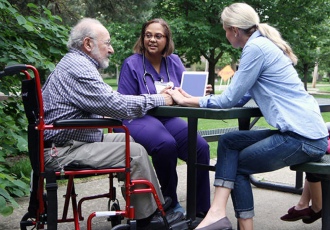By Faith Protsman, MD, Regional Medical Director, VITAS Healthcare
Vietnam War veterans face unique obstacles throughout the twilight of advanced illness. For hospice care providers to tailor care to meet the needs of veterans who have served in this theater of war, they must consider the tribulations these patients face as they reach the end of their lives.
The Vietnam War era was a very tumultuous time to be a soldier. The United States' prolonged involvement in a war of questionable motivation left society with disdain toward the government and its institutions, especially the military.
Coupled with horrific images shown on television, constant controversy was a new reality and negative public opinion formed around this conflict, of which those serving the nation were not spared.
Careful consideration is necessary when treating patients facing these traumas.
Tours of duty proved to be traumatizing in many ways. Young soldiers, some having just turned 18, were drafted into a war that many of them did not believe in. They were not fighting for love of country and God; rather, they were fighting for survival and out of fear for their lives.
Intimate battles in the dense jungle led many to be subjected to the horrors that come with fighting in a foreign land that was only familiar to the elusive guerilla enemy soldiers.
Servicemembers did not receive a warm welcome when returning home from Vietnam, often being judged and labeled as cruel and even inhumane.
Moral Injury Can Impair Mental Health
This “perfect storm” of trauma led to lasting moral injury that plagues many veterans for their entire lives. Veterans returning from the war were marginalized and pushed into isolation, often turning to alcohol and substance abuse, which worsened their anxiety and exacerbated their strife.
Questions like “I’ve never spoken about the war, can I now?” “Was the war moral or immoral?” and “Was I a good soldier?” come bubbling to the surface later in life as their illnesses intensify and their defenses weaken.
Careful consideration is necessary when treating patients facing these traumas.
The restlessness that can result from post-traumatic stress disorder (PTSD) is often treated with benzodiazepines. In most cases, these medications can bring relief through calming the patient.
Yet, there is a common trend amongst veterans who cope with trauma that results in the opposite effect.
Benzodiazepines can lower the walls that Vietnam veterans have built up throughout a lifetime of suppressing trauma and negative memories. This class of medications can exacerbate the symptoms of PTSD as traumatic experiences and feelings of regret resurface. Benzodiazepine-induced inhibition of neurotransmission can even lead to agitated toxic psychosis, increased anxiety, hostility, and rage.1
The Value of Compassion Along with Clinical Care
Remaining considerate does not end with simply staying mindful during the planning of clinical solutions. Providing care for Vietnam veterans requires a high level of empathy.
A key to an empathetic approach is taking the time to listen nonjudgmentally. Though seemingly simple, practicing nonjudgmental, open communication with patients facing trauma from war can help avoid the all-too typical responses of “It’s okay” and “You did what you had to do.”
These patients do not need sympathy, because they have been judged enough throughout their lives. When care teams approach them without judgment, they honor the sacrifices these heroes have made.
VITAS hospice care provides compassionate care approaches that are tailored to meet the distinctive needs of Vietnam veterans. With the Veterans Administration (VA) offering hospice care as part of its medical package, VITAS team members can provide empathetic psychosocial support, while utilizing clinical solutions that help manage symptoms.
The qualifications for veterans to receive hospice benefits include:
- A life-limiting illness
- Treatment goals that focus on comfort, rather than curative treatments
- A life expectancy of 6 months or less, if their illness runs its normal course
Veterans also benefit from the option to receive concurrent care through the VA. The VA can provide curative treatments as the patient simultaneously receives symptom-managing comfort care administered by the hospice care provider of their choosing.
Offering solace, while remaining compassionate when patients need it most, is too often overlooked in the busy practice of healthcare. Acknowledging the adversity that Vietnam War veterans have had to face throughout their lifetimes and adapting care approaches to meet their needs is the best way for healthcare providers to give back to those who have sacrificed so much for the preservation of freedom.
1Paton, C. (2018, January 2). Benzodiazepines and disinhibition: A review: Psychiatric bulletin. Cambridge Core. Retrieved November 2, 2022, from https://www.cambridge.org/core/journals/psychiatric-bulletin/article/benzodiazepines-and-disinhibition-a-review/421AF197362B55EDF004700452BF3BC6



